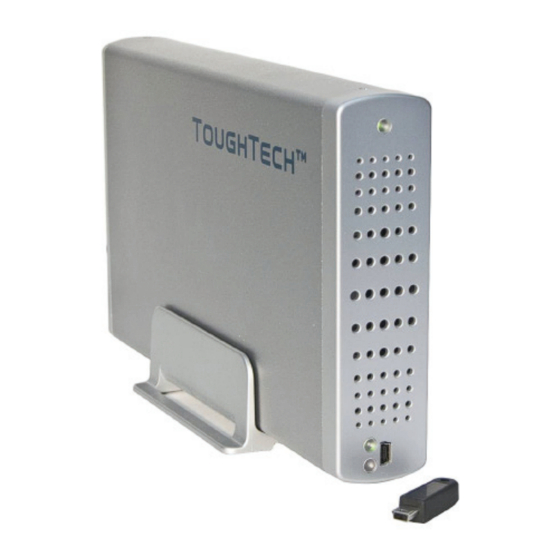CRU Dataport ToughTech Secure Q with WriteLock User Manual - Page 9
Browse online or download pdf User Manual for Enclosure CRU Dataport ToughTech Secure Q with WriteLock. CRU Dataport ToughTech Secure Q with WriteLock 12 pages. Hard drive enclosure
Also for CRU Dataport ToughTech Secure Q with WriteLock: Quick Start Manuals (2 pages)

CRU
5.2 Usage with Windows operating systems
5.2.1 Compatibility
ToughTech uses 3.5-inch SATA (Serial-ATA) hard drives only. ToughTech is fully plug-and-play under Windows XP,
Vista, or 7 when using FireWire or USB. No drivers are needed. The USB2 port is USB 1.1 compatible. ToughTech
does not require drivers for eSATA operation, but eSATA host cards do. If installing an eSATA host card into your
computer, use the card manufacturer's drivers and instructions.
5.2.2 Formatting a drive
If you purchased your ToughTech pre-populated with a hard drive, this step should not be necessary unless you wish
to change the format or erase the drive. To format, use the Disk Management utility.
a) Right-click on My Computer, then select Manage. The Computer Management window will open.
b) In the left pane of this window, left-click on Disk Management.
c) The drive should appear in the list of Disks in the lower middle/right pane (see picture below). You may need to
scroll down to see it. If the drive is already formatted, you can identify it easily by its volume name. If it's
unformatted, the Drive Properties Box will say "Unallocated" and you'll need to initialize the disk before formatting it.
Initialize the disk by right-clicking the Device Properties Box and selecting Initialize Disk.
Device
Properties
Box
d). To format the drive, right-click the Drive Properties Box and select Format.
e) If you are prompted to select a partition type, select MBR for volumes 2TB or smaller, or GPT for volumes larger
than 2TB. Note: Windows XP does not support GPT or volumes larger than 2TB.
f) Click through several more windows, leaving the default settings, until you see a window that allows selection of a
file system. Choose NTFS and enter a name for the new volume. Be sure to check the box labeled "Perform a quick
format" unless you want to completely erase any data on the drive and have time to wait. A quick format should take
less than a minute, while standard formatting may take several hours.
g) Click "Next" and then "Finish" to start the format process. When the format is complete, the Drive Properties Box
will update to show the new volume name. The new volume can now be found in My Computer.
U s e r M a n u a l f o r T T - Q , T T S - Q ( A9 - 0 0 0 - 0 0 0 1 r e v 1 . 5 )
Drive
Properties
Box
- 9 -
